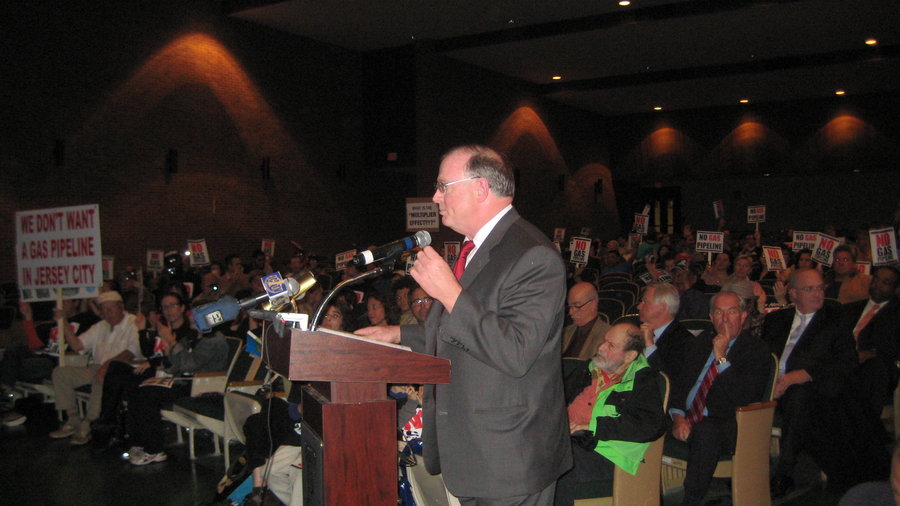A controversial proposed natural gas pipeline that is expected to be routed through Jersey City and Bayonne, as well as near the Hoboken border, has received a major boost from a state environmental agency.
Bob Martin, commissioner for the New Jersey Department of Environmental Protection (DEP), announced Dec. 2 that his agency has approved several permits for Spectra Energy’s natural gas pipeline project.
The project would add 19.8 miles of pipes in Linden, Bayonne, and Jersey City. It would ultimately cross the Hudson River into New York to serve Con Edison customers in Manhattan and on Staten Island.
“The DEP today approved several required environmental permits, including waterfront development, flood hazard, and freshwater wetlands permits, for Spectra Energy’s proposed natural gas pipeline expansion project through parts of Hudson and Union counties,” Martin said in a prepared statement. “The permits were issued only after Spectra Energy complied with DEP’s demands for a series of environmental improvements to its original proposal.”
DEP Commissioner Bob Martin echoes many of Spectra’s talking points on the pipeline project.
____________
The issuance of these permits a departure from the DEP’s previous stance on the pipeline. Earlier this year the agency filed for legal standing for the right to sue if the project is ultimately approved.
City: ‘Doesn’t change our position’
Many residents, city officials, elected leaders, and the administration of Jersey City Mayor Jerramiah T. Healy have all come out against the pipeline project, most recently in October when the Federal Energy Regulatory Commission (FERC) held a public hearing in Jersey City on the pipeline.
Opponents to the project argue that the pipeline would snake dangerously close to residential neighborhoods, schools, areas slated for future development, and important transportation infrastructure sites, including the Holland Tunnel, Hudson-Bergen Light Rail, and PATH train system. If there were an explosion, the homes and facilities could be affected.
In January, the DEP filed for intervenor status with the federal government. Being an “intervenor” gives an individual, government agency, company, or municipality legal status to sue in federal court should the pipeline be approved.
It now appears unlikely that the DEP will join such a lawsuit.
“The DEP has apparently done its investigation and feels they can issue its permits. However, these permits are contingent on FERC approval,” Healy said. “Furthermore, this does not change our position and this administration’s resolve to oppose plans for this volatile substance to be transported under this city at pressures up to 1,200 [pounds per square inch]. When you do the risk-benefit analysis, our good friends across the river in New York City reap all the benefits, while the people of Jersey City and the state of New Jersey bear all of the risk.”
On Dec. 7, Healy’s office announced that the mayor has asked President Barack Obama to intervene in the matter. Last month, the Obama administration postponed a decision on the 1,700-mile Keystone XL pipeline that would connect oil sands in Canada to refineries in Texas, another proposal that has raised environmental concerns.
DEP: Pipeline ‘will enhance environment’
The residents, officials, and businesses of Jersey City continue to be the strongest voice against the Spectra pipeline, opposition that may grow now that the DEP has issued permits for the project.
In his Dec. 2 statement, Martin echoed many of Spectra’s talking points on the pipeline project, a number of which have yet to be proven.
“This project…will enhance the state’s environment, our economy, and is a plus for New Jersey’s energy future,” Martin stated. “It will provide the Garden State with an expanded supply of cleaner and less expensive natural gas that will benefit state residents and businesses, while also providing a more environmentally friendly domestic supply of energy to the state and region…In addition to moderating the cost of energy for consumers, the construction of the pipeline will spur the creation of new jobs – an estimated 1,000 direct construction jobs and more than 5,000 other in-state jobs.”
Officially, the city of Bayonne has not taken a formal position on the pipeline, but appears to be close to endorsing it. The company has made route changes in response to concerns from Bayonne officials.
Hoboken Mayor Dawn Zimmer and the Hoboken City Council continue to oppose the pipeline.
FERC must approve the pipeline before it can be built. The federal agency is expected to release its final Environmental Impact Statement in January. FERC has up to 90 days from this Environmental Impact Statement to issue a final decision on the proposed pipeline.
Spectra will also have to receive approval from the Army Corps of Engineers.
E-mail E. Assata Wright at awright@hudsonreporter.com.
